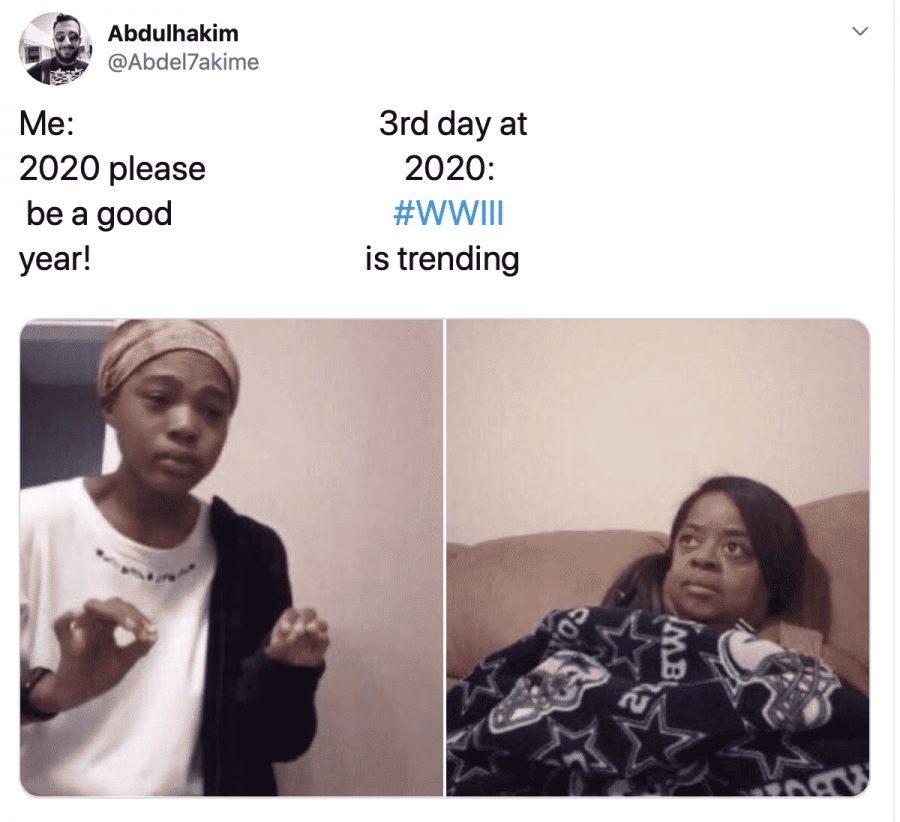Unrest in Iran—and Teens’ Unorthodox Coping Mechanism
January 20, 2020
Tensions between the United States and Iran escalated when the US killed Qasem Soleimani in a targeted drone strike as he travelled through Iraq on January third. Soleimani was a powerful Iran general, has been sending military groups to attack US bases since the US invaded Iraq in 2003. In addition to being responsible for the deaths of hundreds of American soldiers, when under Soleimani’s control, Iran’s Quds Force and Revolutionary Guards funded terrorist organizations aimed at the US, including the Hezbollah movement. Hezbollah militia commander Abu Mahdi al-Muhandis was also killed in the drone strike.
Between Iran’s failures to uphold their end of the Iran nuclear deal and the United States’ withdrawal from the deal in 2018, tensions between the two countries have been on the rise. In the last two years, the US placed various sanctions on Iran, but Trump’s decision to launch the missile marks a striking change in US policy towards the country. In response, Iran launched missiles at US bases in Iraq, which, while no one was killed, put American troops’ lives in danger. Then, thinking it was a US fighter jet, Iran shot down a Ukraine commercial airplane, killing over 200 civilians. When Iran tried to lie about how the plane crashed, Iranian civilians emerged in sharp opposition, with protests taking place across the country. With so many lives being put in danger, Trump’s decision raises concerns as some worry that actions like his could lead to another seemingly never-ending war in the Middle East.
In the midst of this unease, America and Iran’s youth have taken advantage of a relatively new coping mechanism: making memes. In the days after the missile strike, World War III jokes were all over Instagram, Tik-Tok, and Snapchat, and as the situation continues to unfold, the jokes continue to be made. Although freshman Phoebe Krueger recalls that she initially learned about the attack when, “I saw a news alert on my phone and then I read an article about it,” she says there are “definitely a lot of jokes on Instagram and reposted on peoples’ Snapchat stories.” Now, “I feel like I have seen more jokes about it than real articles,” she admits.
With memes about teens escaping a hypothetical draft and struggling to follow war commands, the jokes tend to blow the situation in Iran a bit out of proportion. Phoebe remarks, “With all of the jokes and everything, I wasn’t entirely sure about the severity of the situation and the actual odds of World War III.” Upon further reflection, she says, “Because of how extreme [the jokes] were, I would say that they weren’t super misleading.” She recognizes that there is still the potential of a misinterpretation, as “with any joke someone can take it the wrong way. In the end, it really depends on the person reading it.”
If the memes are just extreme exaggerations, why do people continue to make them, and why do people find them so funny? Phoebe says, “I feel like it definitely lightened the situation but obviously didn’t change the actual severity of it.” Junior Milana Jozwiak agrees that these jokes are made solely in the name of fun, and are far from political statements. She says, “I think that it is making light of a difficult topic because the US has outlawed the draft, which is what many people are making memes about. People are kind of making the situation up more than believing it as a potential reality.” She believes that these jokes serve as a healthy coping mechanism during turbulent times, saying, “I honestly find them really funny as they are just our generation’s way of making something positive out of a not ideal situation.”
Junior Rashail Wasim agrees that “they’re hyping up something that isn’t going to happen, but they’re really funny.” However, he admits that they blur the facts of the situation. When asked whether he thinks the jokes spread misinformation, he says, “yes, absolutely,” as “the information that they give is very misleading.” Ultimately, he isn’t too concerned about the confusion causing real damage partially “because most of the people spreading the memes aren’t of age to be drafted,” and mostly because “it’s still helping people become more aware.” He says, “It made them search up what is happening with Iran so I feel like it led some people to inform themselves.”
Unfortunately, people are not doing the research as often as they should. “I feel like it informed people but not really about how bad it was and the people it affected,” Phoebe worries, “Most of the people that saw the jokes in my opinion should have taken the next step to read the news articles but probably didn’t.” Milana agrees, “I feel like some are educated on the issue, but most people making the memes don’t really know what’s happening.” When asked if the trend is helping to educate people, she says, “people have heard bits and pieces but I think haven’t really taken the time to go into full depth.” She says that on the other hand, “I think it sparks fear in some people which would motivate them to find out what is happening.”
Whether or not the memes are actually making kids more educated on what is going on in Iran, at least they raise awareness about current events. For some, that awareness could spark further research and understanding, while for others, it could lead to misinterpretations. With memes like WWIII going viral, one cannot deny that internet jokes have become one of our generation’s biggest coping mechanisms when faced with tough political issues. As Milana put it, “there’s always a meme trend and this is one of them, and this one is particularly funny.”























































Robert Igbokwe • Jan 25, 2020 at 8:24 pm
Amazing article, Bea!! 🙂 🙂 Great job at incorporating a variety of view points. Gosh, I think Milana’s quote entirely sums up my reaction to the memes! “I honestly find them really funny as they are just our generation’s way of making something positive out of a not ideal situation.” Whether or not making something positive out of this situation is a good thing is up for debate. But that’s just how Gen Z works right now.
James M Joyce • Jan 21, 2020 at 7:25 am
Good piece, Bea and company. It’s cool to see that The Forum reports not just on the news but how we read it, or on the way it influences pop culture,